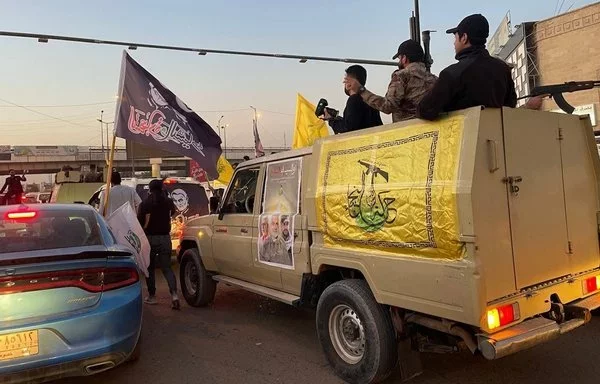Security
Iraq rejects conflict, orders crackdown on Iran-backed militias
Baghdad moves against militias launching attacks from Iraqi soil, but faces a delicate balancing act as Iranian proxies adapt and tensions rise.

By Anas al-Bar |
Iraq has launched an aggressive campaign to crush Iran-backed militia operations within its borders as attacks on other nations have exploded in frequency.
Iran-backed militias launched 90 attacks on Israeli targets in October and 60 more in November, in a significant escalation from 37 in September, according to the Washington Institute for Near East Policy.
In an emergency security meeting November 19, the Iraqi government issued iron-clad directives to security forces and intelligence agencies to stamp out "any military activity outside state control."
Officials demanded "effective security depth" along Iraq's western borders, pinpointed as the primary staging grounds for these attacks.
![Iraqi Prime Minister Mohammed Shia al-Sudani holds an emergency security meeting on November 19. [Iraqi News Agency]](/gc1/images/2024/12/04/48307-iraq-security-meeting-600_384.webp)
"Iraq's stance is clear and publicly declared in rejecting any expansion of war in the region, and refusing to become part of the ongoing regional conflict," said Iraqi MP Amer al-Fayez of the parliamentary foreign affairs committee.
The crackdown has yielded results, according to Maj. Gen. Yahya Rasul, spokesman for the Commander-in-Chief of the Armed Forces.
He confirmed authorities "have succeeded in seizing weapons prepared for launch" and are aggressively pursuing legal action against perpetrators.
The government has made it clear that field commanders will face consequences for security breaches in their zones.
Militias relocate under pressure
Yet these measures have forced militias to evolve.
These groups are now relocating operations to Syrian territory, driven by "political pressures on the factions," said Ali Fadlallah, former spokesman for the Huquq Movement -- a parliamentary bloc controlled by Kataib Hizbullah.
Intelligence sources say Iranian short-range ballistic missiles are being smuggled into Iraq inside water and oil tankers, Shafaq News reported.
Iranian weapons and drones are being assembled and stored in locations such as Jurf al-Sakhar, political analyst Abdul Qader al-Nayel told Al-Fassel.
He warned that the Iranian regime seems intent on transforming Iraq into a new score-settling battleground in the region.
Baghdad's stance stems from fears of devastating retaliation, political analyst Mujashaa al-Tamimi told Al-Arabi al-Jadeed.
He said the authorities recognize any reprisals could trigger "security, political, and economic problems for Iraq."
Former Prime Minister Haider al-Abadi reinforced these concerns on November 24, cautioning against allowing "adventurists" to hijack national policy or take sides in regional conflicts against Iraq's interests.
While Iraq maintains support for diplomatic solutions and relief efforts to defuse regional tensions, its primary mission through the new directives remains to protect Iraqi sovereignty, a senior Iraqi source told Al-Fassel.
The government hopes to prevent the nation from being pulled into a wider conflict, said the source, who asked that his name be withheld.
O God, help Iraq and its people, O Most Merciful of the merciful.